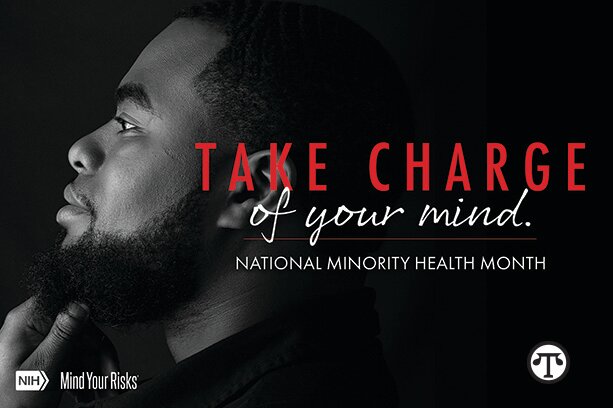 Post Classifieds
Post Classifieds
Stroke & Dementia in Black Men: Tips for Staying Healthy During National Minority Health Month and Beyond

from the National Institute
of Neurological Disorders & Stroke
(NAPSI)—With nearly 800,000 Americans having a stroke each year, it remains a leading cause of death and long-term disability. Making matters worse for many Black/African American men is that they are at higher risk for high blood pressure and strokes, according to medical experts. For many health conditions, racial and ethnic minority communities are impacted at disproportionate rates. April is National Minority Health Month, a good time to raise awareness about the importance of improving the health of minority communities and reducing health disparities. During this month, the National Institute of Neurological Disorders and Stroke (NINDS) is raising awareness of this important topic and sharing tips to help manage the risk of stroke.
Over time, uncontrolled high blood pressure can damage blood vessels and lead to a stroke. High blood pressure can also lead to other damage in the brain that has been associated with dementia. The good news is people can take steps now to get—or keep—their blood pressure numbers in a healthy range to help prevent stroke and dementia later in life.
Stroke Prevention Tips for Black Men
• Know your blood pressure numbers. Blood pressure is measured using two numbers. The first number, your systolic blood pressure, measures the pressure in your arteries when your heart beats. The second number, your diastolic blood pressure, measures the pressure in your arteries when your heart rests between beats. If the measurement reads 120 systolic and 80 diastolic, you would say, “120 over 80,” or write, “120/80 mm Hg.”
• Normal Blood Pressure for Most Adults
Less than 120/80 mm Hg
• High Blood Pressure
130 or higher/80 or higher mm Hg
• Stay informed. Discuss high blood pressure with your healthcare provider. Talk to your healthcare provider about your risks and ways to manage your blood pressure to help prevent stroke and dementia.
• Take your medications. Your healthcare provider may recommend taking medicine daily to prevent stroke and heart attack, especially if you have high blood pressure.
• Quit smoking or using tobacco. Smoking harms nearly every organ in the body, including the heart. Any amount of smoking damages the heart and blood vessels.
• Manage your cholesterol levels. Reducing your cholesterol will lower your risk of developing a wide variety of serious health issues, including stroke and heart disease.
• Eat healthy foods and exercise. Choose plenty of fresh fruits and vegetables. Get about 30 minutes of moderate to intense exercise, such as brisk walking or bicycling, every day. Following a healthy eating plan and keeping physically active will significantly lower your risk for heart disease, high blood pressure, and other chronic and debilitating health problems.
• Manage your diabetes. Having diabetes or pre-diabetes puts you at increased risk or stroke and heart disease. You can lower your risk by keeping your blood glucose (also called blood sugar), blood pressure, and blood cholesterol close to the recommended target numbers provided by your healthcare provider.
• Get enough sleep. Getting a good night’s sleep is important for good heart and brain health. Adults should aim for an average of 7 to 9 hours, and babies and kids need more depending on their age.
• Start early. Preventing stroke and heart disease is more effective if started in midlife. Studies also find that controlling blood pressure may reduce the risk of dementia.
These simple and effective lifestyle changes can reduce your chance of all types of stroke, heart disease, and dementia later in life. Taking charge of your health now can help avoid unnecessary risks and keep blood pressure under control.
For more tips and information, visit the NINDS Mind Your Risks® website at mindyourrisks.nih.gov.
On the Net:North American Precis Syndicate, Inc.(NAPSI)
Get Top Stories Delivered Weekly
Recent The Critic News Articles
Discuss This Article
GET TOP STORIES DELIVERED WEEKLY
FOLLOW OUR NEWSPAPER
LATEST THE CRITIC NEWS
RECENT THE CRITIC CLASSIFIEDS
OUTSIDE THE LINES
- Tips for Homeowners to Make Summer Home Projects More...
- When Planning International Travel, Measles Vaccination...
- We Can All Contribute To Cooling the Nation
- Women With Ovarian Cancer Explain Why They Support...
- Women With Ovarian Cancer Explain Why They Support...
- Navigating the Heat to Keep Power Bills Cool
- Navigating the Heat to Keep Power Bills Cool
- The EPA Can Help You Save Big On Energy Efficient...
- Cutting Summer Cooling Costs
- Cool Ways to Protect Yourself from Heat-Related Illness
FROM AROUND THE WEB
- Con el Programa de Ayuda Adicional de Medicare Más ...
- BookTrib’s Bites: Four Riveting Summer Reads
- Medicare’s Extra Help Program Helps More People Save M...
- New Artificial Intelligence Summit Series Kicks off With...
- Mike Bond’s Latest Thriller, CRUDE: Nuclear War is C...
- Subway’s 95-Foot-long Dip ‘N Slides Are Making a Huge Spl...
- Pharmacy Benefit Companies Are More Valuable Now Than Ever
- Marine Toys for Tots' Christmas in July Campaign Delivers...
- Dr. Calm's Expert Advice for Mastering Election Stress
- ABANDONED AT BIRTH Paints Vivid Portrait of the...



